This story is part of the Translating Culture collection, a multimedia showcase of folktales translated from Russian, Spanish, and Arabic, curated by Sofi Sanders. An article discussing the collection is available in the non-fiction section.
A story of hunting, respect, and mutual care
A chapter from South American Jungle Tales by Horacio Quiroga
Once there was a man who lived in Buenos Aires and was a friend of the superintendent of the Zoo. This man had a very happy life, because he worked hard and enjoyed good health. But one day he fell ill, and the doctors told him he would never get well unless he left town and went to live in the country where there was good air and a warm climate.
The man could not think of such a thing, however. He had five little brothers, and both his parents were dead. He had to provide the little boys with food and clothes, and get them ready for school in the morning. Who would care for them, if he went away? So he kept on with his work and his illness grew worse and worse.
One day a man from the Zoo met him on the street and said:

“You ought to go and live an out-of-door life for a while. Now, I have an idea. We need a collection of new specimens for our museum, and you are a good shot with a gun. Wouldn’t you like to go up into the Andes and hunt for us? I will pay for your outfit, and get a woman to look after your little brothers. It will not cost you very much, and there will be plenty of money left for the boys.”

The sick man gladly accepted. He went off to the mountains, many, many miles beyond Misiones, where he camped in the open air and soon began to get better.
He lived quite by himself, doing his own cooking, washing his own clothes, and making his own bed, which was a bag with blankets in it. He did not use a tent, but slept in the bag out under the stars.
When it rained he would throw up a shelter of branches, cover it with his waterproof, and sit down all cozy underneath, till the storm cleared.
He ate partridges and venison, with the berries and wild fruits he found along the mountains. Whenever he saw some rare animal that the Zoo would want, he shot it, and dried its skin in the sun.
In course of time, he made a big bundle of such skins, which he carried on his shoulder whenever he moved his camp to a new place. Many beautifully spotted snakes he was able to catch alive; and these he kept in a big hollow gourd—for in South America wild squashes and pumpkins grow till they are as large as gasoline cans.
All this was very hard work but the man grew strong and healthy again. And what an appetite he had when supper time came around! One day when his provisions were getting low, he went out hunting with his gun. Soon he came to a wide lake, and what should he see on the shore but a huge panther that had caught a tortoise! The fierce animal had drawn the turtle up out of the water and was clawing between the two shells trying to scratch the meat out.
As the man approached, the panther turned and, with a great roar, leaped toward him. The panther was not quick enough, however, for a bullet from the man’s rifle caught him between the eyes and laid him low in his tracks.
“What a wonderful rug this skin will make for somebody!” the man exclaimed; and he carefully removed the hide and rolled it up to take home.
“I think I will have turtle soup for supper tonight,” the man continued as he turned toward the tortoise; for turtle-flesh is one of the richest and sweetest of all meats.
But he could not help feeling very sorry for the poor turtle when he saw what a plight she was in. The panther’s claws had torn the flesh terribly; and a great gash in her throat had all but left her head severed from the rest of the body. Instead of killing the wounded turtle the hunter thought he would try to cure her of her hurts.
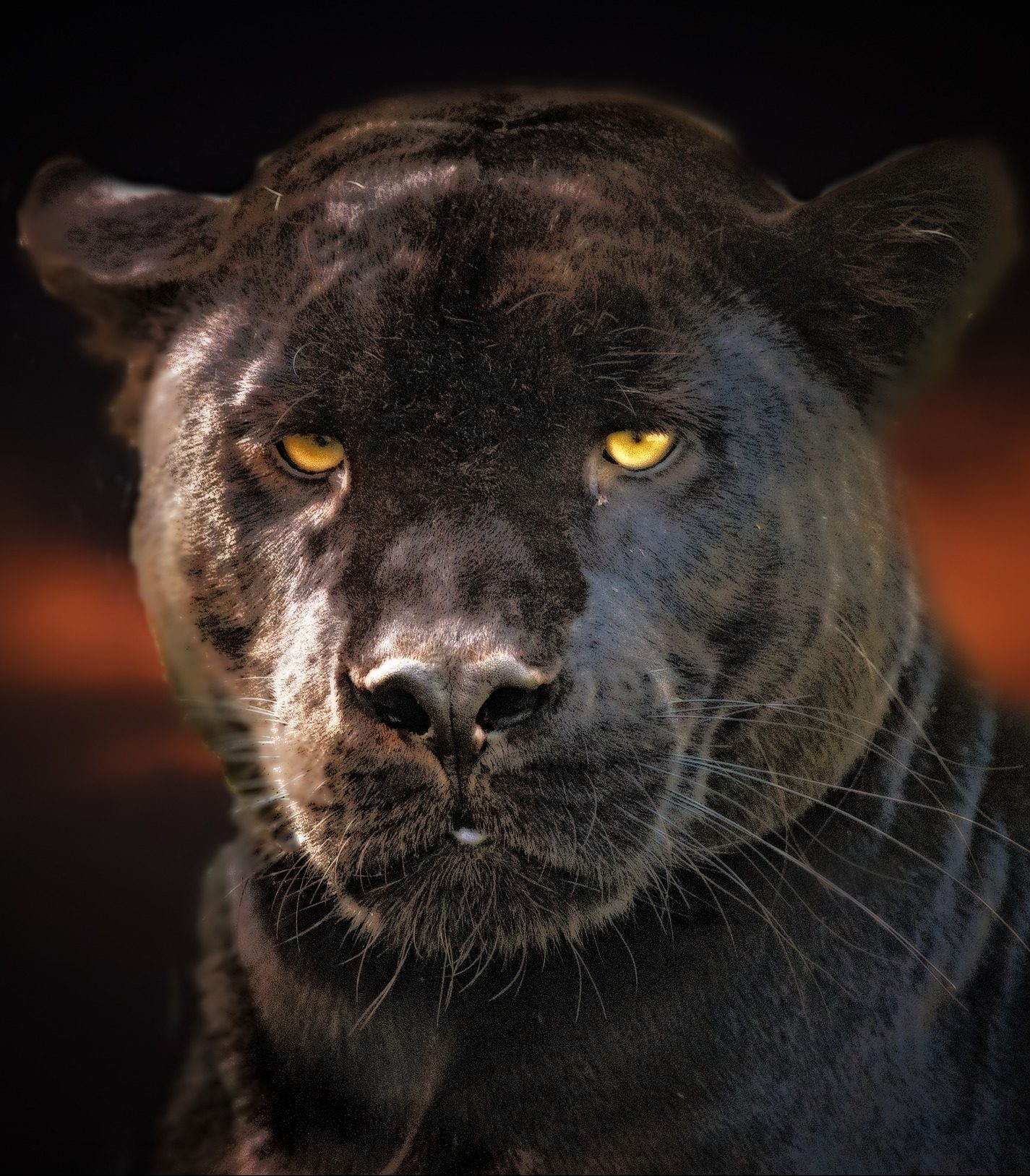
The camp was some distance away and the man was very tired. Besides, when he tried to lift the tortoise, he found she weighed nearly two hundred pounds! Finally he put a rope around her, and pulled and hauled till he dragged her along over the grass back to the camp.
The man had no extra pieces of cloth to make a bandage with, so he cut off a piece of his shirt and took the lining out of his coat. Finally he managed to bind up the tortoise’s throat and stop the bleeding. Then he pushed her into a corner of the shelter, where she lay motionless for days and days.

Twice a day the man would come and wash the wound with water and liniment. When he thought the cut had healed, he took off the wrapping and the tortoise drew her head into her shell. The man kept visiting her every morning, however, tapping gently on the turtle’s back to wake her up.
The tortoise got entirely well; but then something terrible happened. The man caught a fever in the swamps around the lake, and chills and pains began to wrack his body. One morning he could not get out of his sleeping bag, but just lay there groaning. His fever got rapidly worse, and a parching thirst burned at his throat. In his delirium he began to talk out loud:
“Here I am all alone, away out here in the woods. I am surely going to die. There is no one even to bring me a drink of water.”
But the tortoise, all this time, had not been sleeping so soundly as the man had thought. In fact, she had been slyly watching him as he worked about the camp. When the hunter did not get up that morning, the tortoise understood that something was wrong, and also that it was water he kept calling for.
“This man,” thought the tortoise, “did not eat me that day, though he had me in his power and was hungry. Instead, he took care of me till I was well. A good tortoise ought surely to do as much for him!”
The big turtle—she stood as high as a chair and weighed, as I said, as much as a man—crawled off to the lakeside. There she hunted around till she found a small tortoise shell. She polished it with sand till it was bright and shiny. Then she filled it with pure cold water from a spring, crawled back to camp with it, and gave the man a drink.
“Now for something to eat,” said the turtle.
Turtles know the most peculiar kinds of roots and grasses to eat when they are sick. This tortoise went out and gathered a supply of such herbs and fed them to the man; and he ate them without noticing who was finding his food for him, so nearly unconscious was he in his delirium.
So day after day the tortoise went hunting and hunting over the mountain sides, looking for tenderer and tenderer grasses with stronger and stronger juices. And how sorry she was she could not climb trees where such fine berries and fruits were hanging! Thus the hunter lay for a week or more, struggling between life and death and kept alive only by the herbs the tortoise brought him.
And then one day, to the joy of the faithful animal, the man sat up in his sleeping bag. The fever had left him and his mind was clear. He looked around in surprise to see the water and a bundle of grasses near him; for he was quite alone, save for the big turtle that still seemed to be sleeping in her corner.
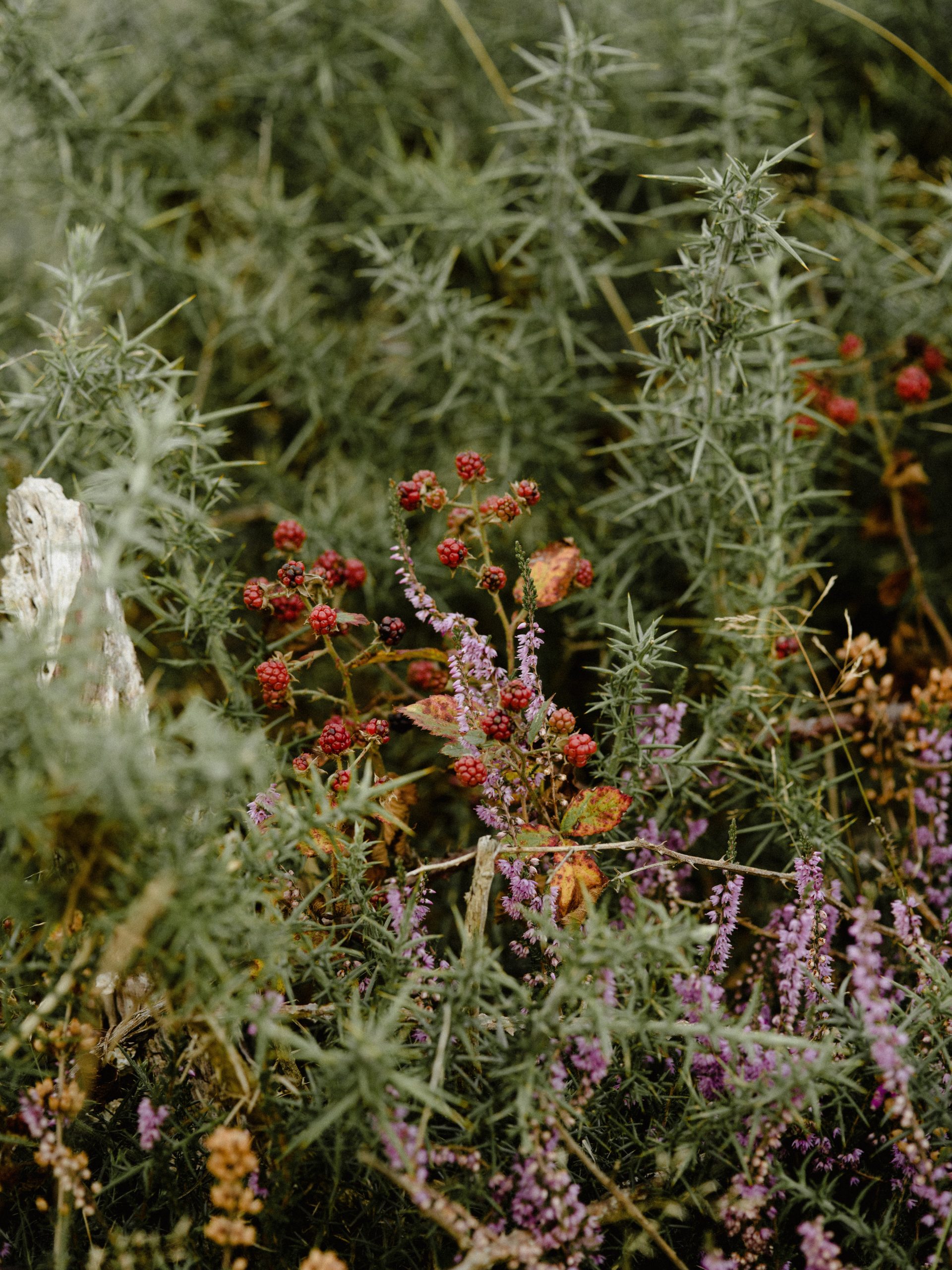
“Alas, I am lost!” he moaned. “No one will ever come to me. The fever will return, and I cannot get any medicine nearer than Buenos Aires. If I could walk, I might get there; but I can’t, so I must die!”
And, just as he feared, the fever did return that evening worse than before; and the man fell back into unconsciousness. But again the turtle had understood:
“Yes, he will die, if he stays here! I must get him to Buenos Aires where there is some medicine!”
Carefully she dragged the bundle of skins up to the man and placed it in position on his body. Then she did the same with the gourd full of snakes. And what a task it was to get the gun in place on top of the whole pile!
Finally she went out into the woods and bit off a number of tough, strong vines. These she stretched across the sleeping man and tied to his arms and legs in such a way as to keep the baggage from falling off. She dug her way under the sleeping bag till everything was balanced on her back; and then she started off toward Buenos Aires.
She crawled along for ten or twelve hours each day, swimming rivers and ponds, sinking deep into the mud of bogs, climbing hills and crossing sandy plains where the sun at midday scorched terribly. In his fever the man kept calling for water; and it was very trying to the poor tortoise to have to get the man off her back each time while she went looking for a drink for him. But she struggled forward just the same, and each night she knew she was that much nearer to Buenos Aires.

But the tortoise, after days and days of this toil, understood that her own strength was giving out. She did not complain, but she began to be afraid that she would die before getting the hunter to a place of safety. And one morning, in fact, she was so tired she was quite unable to move.
“Here I am dying all alone in the woods!” the man moaned from his bag. “No one will help me get to Buenos Aires! Oh, oh, I shall die here all alone!”
You see, the man had been unconscious all the time, and thought he was still lying in the shelter, away back in the mountains. The words stirred the weary tortoise to fresh effort. She got the man up on her back again and went on. But the moment came when she could not take another step forward.
She had not been eating for some days, because she had not dared take the time for hunting. Now she was too weak to do even that. So she drew her legs into her shell and closed her eyes, waiting for death to come, and mourning inside her turtle-heart that she had failed in saving the life of the man who had befriended her.
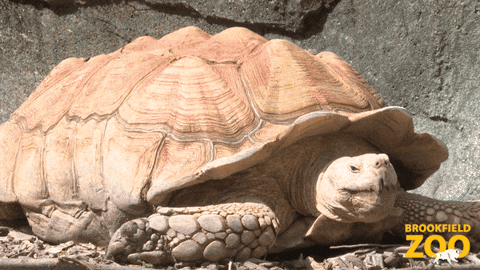
The sun went down and night fell. As the turtle chanced to open her eyes, she was surprised to see a reddish glow on the distant horizon; and she heard a voice—the voice of a wharf rat—talking near by. The rat was saying:
“My, what a turtle, what a turtle! I never saw such a big one in my life! And what is that on her back? A cord of wood?”
The poor turtle did not know that those lights came from Buenos Aires, and that the rat was a citizen of that town, out for a night’s foraging in the fields of the suburbs.
“It is not a cord of wood,” the turtle murmured, “It is a man, a sick man!”
“And what on earth are you doing here with a man on your back?” the rat inquired, laughing the way rats from the city laugh at their country cousins.
“I … I was …” the tortoise murmured faintly, “I was taking him to Buenos Aires to be cured … but I shall never get there…. My strength has given out…. I am going to die … we are both going to die, right here!”
“I never saw such a silly turtle!” the rat replied. “Don’t you know you’re in Buenos Aires now? Don’t you see those lights? They’re from the theater district. Go along straight ahead; and you’ll get there in no time!”
This encouraging news filled the tortoise with new life. She strained every muscle inside her shell and moved slowly but surely forward. When it was daylight she found herself quite inside the town. And who should come along the street but the superintendent of the Zoo!
“My, what a turtle! What a big turtle!” he exclaimed. “And what in the world is she carrying on her back?”
The tortoise could not speak from sheer fatigue. She stopped, and the man came up to examine the strange outfit on her back.
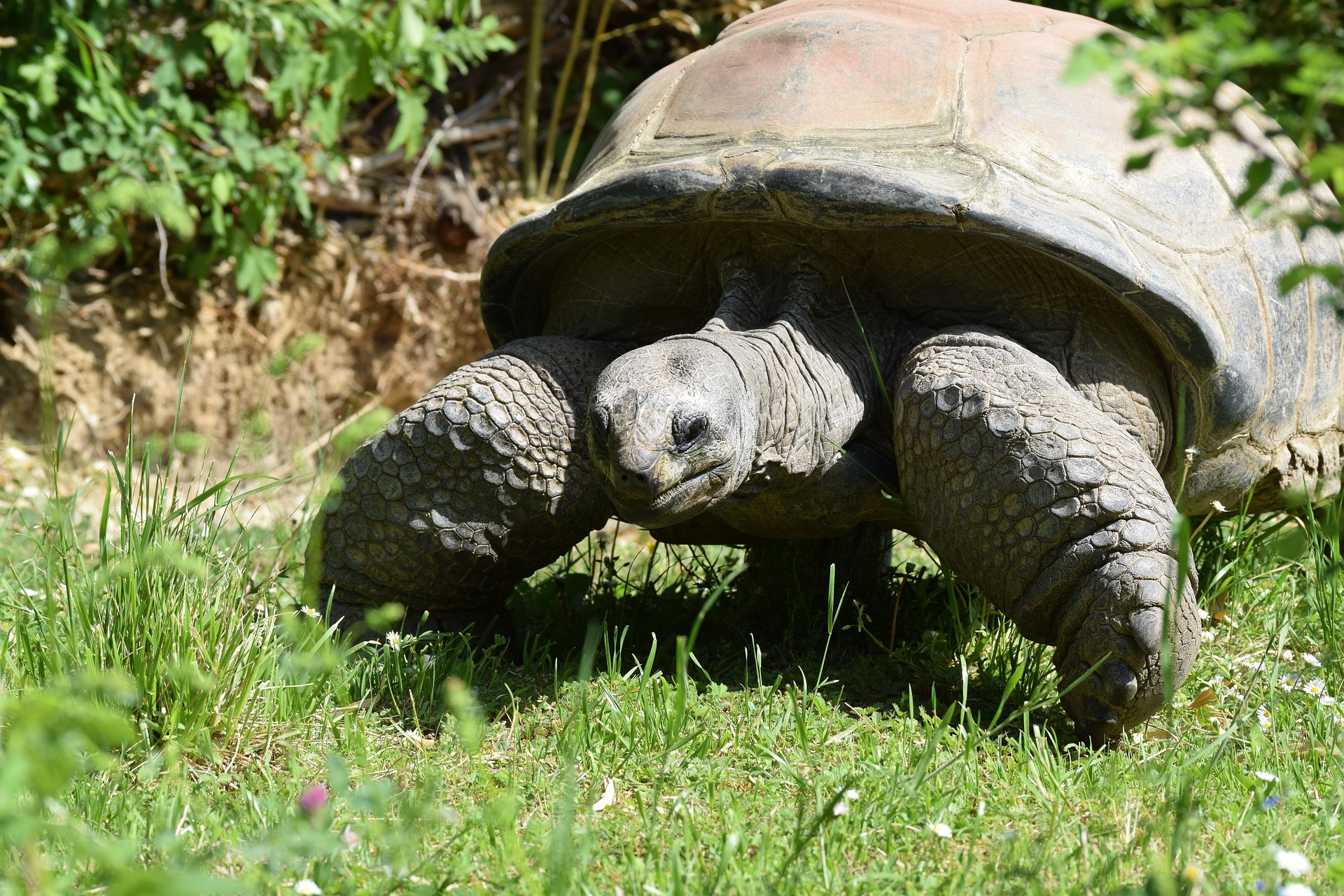
To his amazement, he recognized his friend in the man sleeping, pale and fever-stricken, inside the bag. He called a carriage and got the man home, sending for a doctor to come at once.
In course of time, the man got well. When he learned that the tortoise had brought him miles and miles on her back, all the way from the Andes to Buenos Aires, he could hardly believe the story. And out of gratitude he said he would make a home for her the rest of her life. His own cottage was quite filled with his six little brothers; and there was no room for such a big pet in the house. But the director of the Zoo said he would find a place for her there, and care for her as tenderly as he would for his own daughter.
And that is what happened. The tortoise was given a house for herself alone, with a tank of water in the front yard, where she could swim if she wanted to.
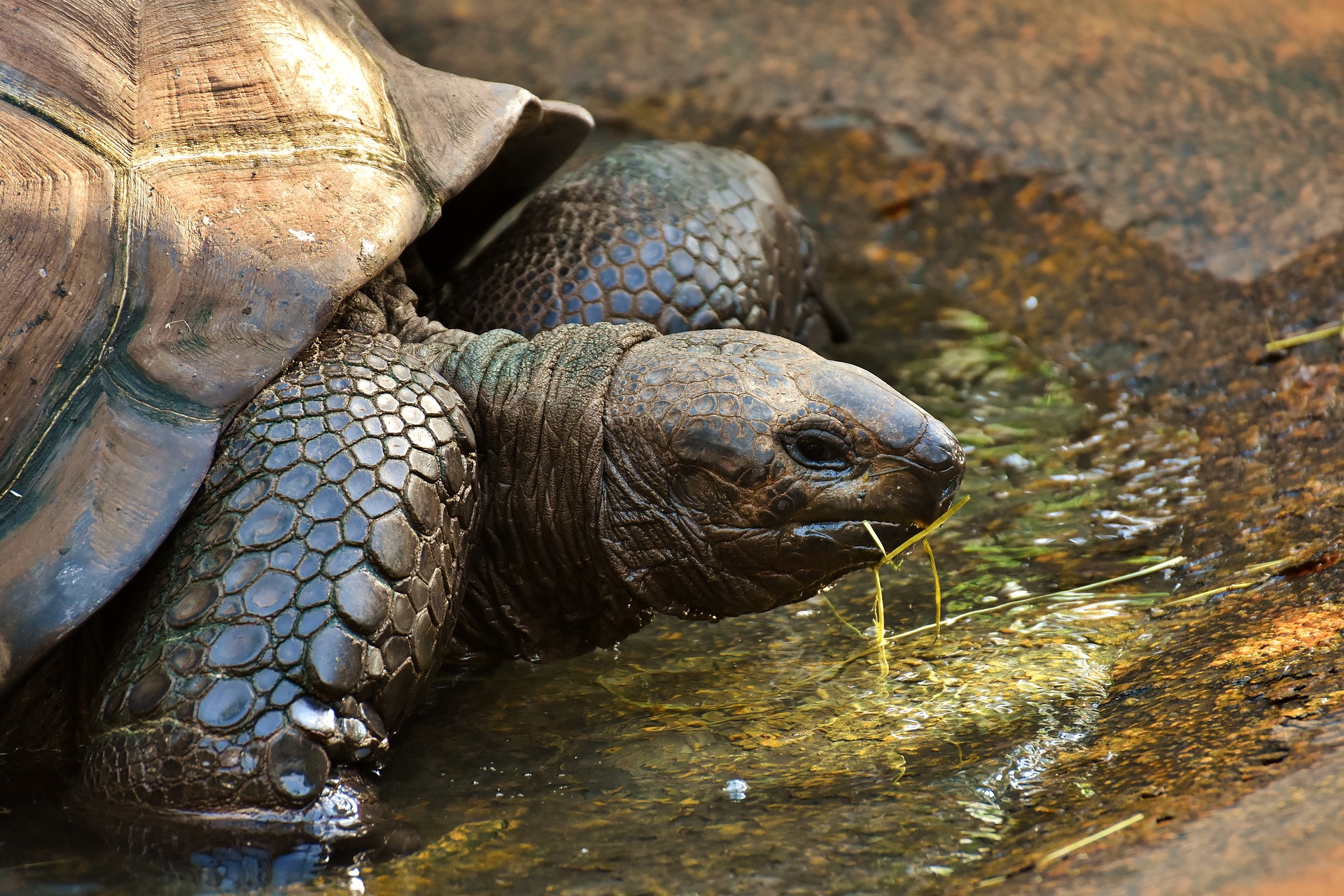
She was allowed to wander at will over all the gardens of the Zoo, though she spent a large part of her time near the monkey house, where there was most to eat.
And she is still living there. Go to the zoological park any day and you will see an enormously big tortoise crawling slowly along over the green grass.
If you wait long enough you will see a man come up, stoop over and rap gently with his knuckles on her shell. That’s the tortoise we have been talking about—and that’s the man!
The End
Works Cited
“Obelisk in the city of Buenos Aires overlooking 9 de Julio Avenue” by Nestor Barbitta is licensed under the Unsplash License.
“A green snake coiling on a leaf” by Alfonso Castro is licensed under the Unsplash License.
“Black panther” by Pixabay is licensed under CC0 1.0.
“Green red flower” by Annie Sprat is licensed under the Unsplash License.
“Tortoise” by Pixabay is licensed under CC0 1.0.
“Giant Tortoises” by Pixabay is licensed under CC0 1.0.
© 1922 from South American Jungle Tales by Horacio Quiroga. Authorized translation from Spanish (Cuentos de la Seloa) by Arthur Livingston. First published in 1922 by Duffield and Company. This story and all images, gifs, and audio included are in the Public Domain under Creative Commons license.
About the Author
Horacio Quiroga was a Uruguayan short-story writer with a unique imaginative style of writing about the struggles of man and animals to survive in the jungle. After traveling in Europe during his youth, Quiroga spent most of his life in Argentina, living in Buenos Aires and taking frequent trips to San Ignacio in the jungle province of Misiones, which provided the material basis for most of his stories, including “South American Jungle Tales”.
About the Curator
Sofi Sanders is an assistant editor of HIVEMIND Magazine, focusing on the visual design of the website as well as this Translating Culture collection and its accompanying article. She is a Russian-American graduate student completing the Global Media and Cultures Master of Science at Georgia Tech with a concentration in Russian. Sofi is currently focusing on the interrelationships within cross-cultural communication and also investigating the state of the Russian news media, particularly with regard to corruption, censorship, and bias. Her interest in speculative fiction stems from fond childhood memories of Lord of the Rings, as well as her passion for cross-cultural (meaning alien cultures too!) reading and writing.